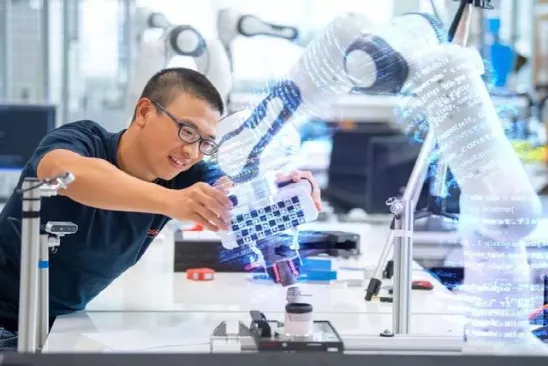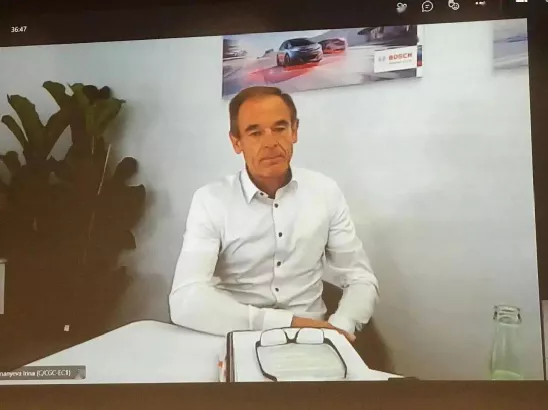AutocarMax of the Travel 100 People Association, focusing on the evolution of the automotive travel industry chain
Author: Zheng Wen
Recently, AutocarMax, a member of the Travel 100 People Association, participated in an online media interview with Bosch, which can be said to have overturned some common industry perceptions.
It is said that we are in the great change of a century, and Dr. Volkmar Denner, Chairman of the Board of Bosch Group, gave a concise answer to the pressure brought by electrification and intelligence: Be prepared.
“Bosch has been preparing for electrification for a long time. It is not a big surprise or a big change for us. It can be said that Bosch is the only company in the world with such a wide range of electrification products and domains. We provide different applications and products for different segmented markets.” Dr. Denner talked confidently about the company’s leading advantages.
“For Bosch, which has a wide range of businesses, being fully prepared for electrification brings huge opportunities for us.”
Where does the confidence come from?
Why can Dr. Denner make such a “mad speech” in the face of such an important industry change? He gave a more detailed answer.

Cars originally have many automotive electronic systems, and many electronic system suppliers are independent. After the components are written into software and encapsulated, they are delivered. For example, in-vehicle entertainment systems, if media playback software is needed, the OEM will directly purchase the system.
However, with the development of automotive electronic and electrical architecture, automobiles have become participants in the Internet. OEMs will also develop many software to make their cars stand out. Therefore, the black box trading mode in the past is difficult to sustain, and the cooperation mode between OEMs and suppliers in the past has been suddenly broken, and open source software has become a trend.
Under such a background, suppliers like Bosch need stronger software integration capabilities.
“So we need very rich software integration experience. We can integrate from different open source channels, procurement sources, including some self-developed, into a very complex software, which requires high software development and integration skills, and believe it will be in the future as well.”

However, this is obviously not an ability that can be easily obtained. Taking the domain controller, which is currently very popular, as an example, in Dr. Denner’s view, the complexity of software is also a very important factor, and the complexity shows an explosive growth.For domain controllers and in-car computing platforms, the complexity of software is very high, and there are different sources, which must be integrated to work. This is a huge challenge for the industry. We recognize that software integration skills are very important, not marginal, but a core capability, said Dr. Dengnarl.
Dr. Dengnarl also pointed out that “software-driven cars in the future require companies like Bosch with deep technical accumulation in both automotive electronics and the Internet of Things to ensure the realization of vehicle networking. These cars require new electronic and software architectures, which Bosch can provide.”
At the software level, Bosch’s layout has been there for a long time. As early as 2014, Bosch released the “3S” strategy, which includes Sensors, Software, and Services. Currently, almost half of the R&D personnel in the Automotive and Intelligent Transportation Technology Department of Bosch are software engineers.
Taking the in-car entertainment computer with the highest software density as an example, by 2025, the computing performance and complexity of in-car entertainment computers will double, and integrated third-party software will account for up to 90%. In this field, Bosch will achieve an annual growth rate of 25% from now to 2025, which is much higher than the average.
In addition, in the field of autonomous driving, Bosch’s one-stop solution includes domain control units, sensors, and connectivity. It has more than 5,000 engineers dedicated to autonomous driving research.
From a higher level, Bosch has made sufficient preparations. “Bosch’s early investment in the field of electric mobility has accumulated to 5 billion euros. Only this year, we will add an additional investment of 700 million euros. Through these investments, we expect to accelerate development in the European Union,” said Dr. Stefan Hartung, chairman of the Automotive and Intelligent Transportation Technology Department of Bosch. Bosch is ready to meet the growing demand for electric mobility worldwide, “and in the future, there may be no car without Bosch technology.”
So why does Bosch have such foresight? This requires exploration from Bosch’s corporate genes. As a heavyweight supplier in the automotive industry, its growth is accompanied by the development of the European automotive industry. The logic of Bosch’s development is consistent with the underlying logic of the European automotive industry, which is based on persistent competition through core technology research and development and high-end brand positioning, rather than rapid development driven by the market and capital like the US.The market has given an answer to the sustainability and advantages of these two development models. In 2005, American Delphi handed over its dominant position to Bosch, and since then, no one has been able to shake Bosch’s position in the global automotive parts industry.
Guus Keder, a European partner consultant of Zhouzhanggui, once said that “the root cause of Delphi’s decline lies in its CEO’s long-term catering to the capital market culture of only market value theory and heroism brought by Wall Street. Wall Street only looks at the quarterly report, so Delphi needs to constantly cut costs, reduce R&D scale, and hype hot concepts.”
Bosch is not even a listed company.
Today, the overall industrial foundation of Europe has shown a trend of degeneration since World War II, and it is not easy for Bosch to perform so well in a large industrial environment.
Throughout Bosch’s development trajectory of more than a hundred years, value innovation has been present throughout:
In the 1990s, Bosch launched the automotive micro-mechanical sensor, and then developed miniature consumer electronic product sensors.
In 1995, Bosch launched the ESP electronic stability system that can avoid vehicle side slip, which has epoch-making significance. In the same year, it launched the TravelPilot navigation system with route guidance and voice output functions.
After 2000, Bosch began to focus on the intelligent field, first starting with small and lightweight devices such as smart screwdrivers, then launching electric bicycle transmission devices, and continuously exploring in the fields of intelligent driving and the Internet of Things… From smart homes to smart cities, from connected transportation to connected industries, Bosch has been exploring more innovative solutions.
Until today, Bosch has always been present on the road of tracking the latest needs and technological trends.
For more than a hundred years, Bosch has insisted on analyzing and researching future trends from multiple perspectives, forming a Megatrend trend report of several hundred pages. This report surpasses the pattern of automobiles and parts, and analyzes based on underlying logic such as human development, aging, and genetic science in a comprehensive and detailed manner.
In this way, this company inspects its demands and constantly reflects on its current competition and future competitive position in the annual trend research. The most profound feeling is that the company has always been working hard, which is what we call “keeping a low profile.”
At this point, Deng narr’s confidence in Bosch is basically supported by logical reasoning. Bosch had already been keenly aware of the technological trend that we now perceive.It is interesting that in 2017, there were no signs of any chip shortage in the automotive industry when Bosch announced a €1 billion investment to build its second wafer fab in Dresden, Germany.
Dr. Denner said at the Munich Auto Show that, “Ten years ago, we predicted that cars would become internet terminals and this has now become a reality. From vehicles to the cloud, Bosch is active in various software development areas.”
Starting from the ignition, Bosch is no longer an ordinary company today. With nearly all-encompassing electrification and intelligence product components from SiC chips to pre-integrated bridge modules, from domain control units, sensors to AI, almost no company can provide such comprehensive electrical and intelligent product components as Bosch.
In 2021, Bosch Automotive and Intelligent Transportation Systems division is expected to grow sales nearly 10%, while its growth in driver assistance systems and sensor business will exceed 40%. In the field of electric mobility, Bosch’s sales growth rate is twice that of the market. Sales in this field will exceed €1 billion in 2021 and reach about €5 billion in 2025.
Electric mobility will become a major core business for Bosch, and zero-carbon travel will be a growth point.
Today, this seemingly “conservative” German company with genes that are full of “crisis awareness” has not been left behind in the automotive industry. Perhaps, the pain of this transformation can quickly reach a turning point for victory.
The civilization of the roaring engines in Europe is disintegrating, and the old traditional industrial motherland of Germany does not have the so-called genes of intelligence. Bosch, from the center of the vortex, seems to be driving away from it, away from the crisis…
The case of Bosch seems to be a reminder to other industrial enterprises not to be afraid of slow progress. As long as they walk far enough and long enough, they will win.
This article is a translation by ChatGPT of a Chinese report from 42HOW. If you have any questions about it, please email bd@42how.com.